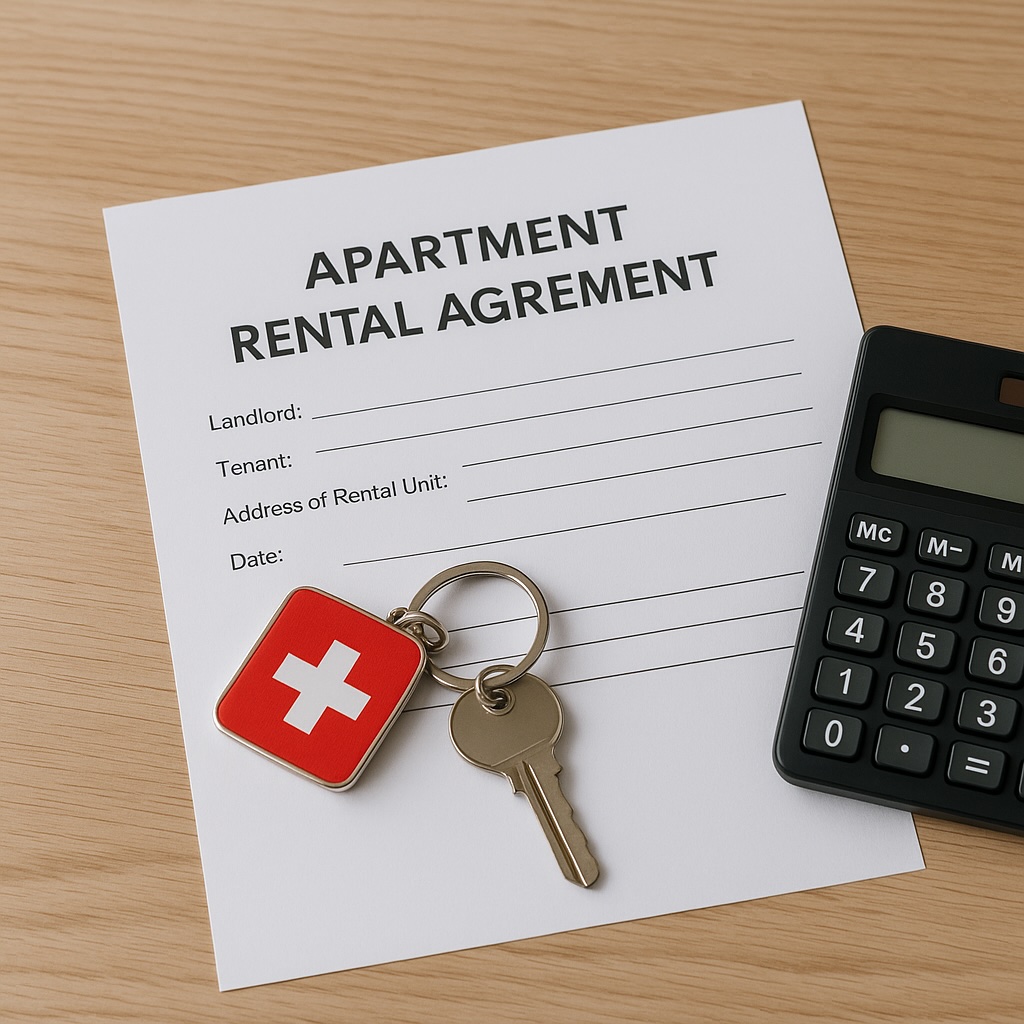Securing a rental in Switzerland can feel overwhelming—competitive market, unique regulations, and strict application processes raise the stakes. But with the right knowledge and preparation, you’ll stand out and find a comfortable home at the right price. Here are essential strategies to navigate the rental market with confidence.
Understand Swiss Rental Market Context
Swiss renters do not typically negotiate utilities like in other countries—costs are often included or separately billed based on consumption. Apartments in major cities such as Zurich, Geneva, Basel, and Lausanne are especially competitive, with average rents often exceeding CHF 2,000 for modest apartments.
Know What You Can Afford
As a rule of thumb, your rent—including Nebenkosten (“NK” or incidental heating/water charges)—should not exceed 30% of your gross income. To qualify, most landlords expect you to make at least three times the annual rent in gross income (e.g. if rent is CHF 2,400/month, your gross annual should be at least CHF 86,400).
Prepare a Strong Rental Dossier
Swiss landlords expect comprehensive dossiers:
- Copy of passport + Swiss permit
- Recent salary slips and employment contract
- Bank statements (3 months) showing stable finances
- Betreibungsauszug (debt registry extract) – available at local authorities, shows your credit history
- References from prior landlords (if you have them)
Compile documents neatly in a folder or PDF file; this increases your credibility and speed.
Use the Right Rental Platforms
Most listings appear on:
- Homegate, ImmoScout24, Comparis, Flatfox – mainstream platforms
- Newspapers: 20 Minuten classified ads; Rencontres immobilieres in French-speaking cantons
- Facebook groups: “Expats in Lausanne”, “Zuerich WG Zimmer”
- Rental agencies: Offer access to exclusive properties with added fees (~one month’s rent)
Set alerts to receive notifications for new listings—timeliness is critical.
Act Fast and Apply Quickly
Quality apartments are often rented within days of listing. As soon as you find something suitable:
- Quickly prepare your digital dossier
- Email or submit via portal with a short, polite introduction (e.g., “Dear Ms. Weber, I’m relocating with work and find this 2‑room apartment ideal. Please find attached my application.”)
- If possible, call or message the landlord to confirm receipt
First impressions matter—show yourself as organized and respectful.
Understand Swiss Lease Agreements
Leases (“Mietvertrag” or “bail”) often have:
- Minimum duration (often one year) with auto-renewal
- Notice periods for tenant and landlord (typically 3 months, e.g. to end on March 31)
- Deposit (Kaution) limited to three months’ rent; must be held in a blocked account
- Utilities clause outlines what’s included or billed separately; check meter options
- Rules about pets, subletting, noise, overnight guests, and common areas
Read terms carefully. If unclear, ask the landlord or seek advice from local tenant associations like Mieterinnen- und Mieterverband.
Know Your Rights and Tenant Protections
Swiss tenants enjoy strong protections:
- Rent increases are allowed only with proper notice and justification (e.g. based on cantonal indices)
- Unlawful clauses in the lease can be challenged
- You can request rent reductions or repairs for issues impacting habitability (e.g. heating failure)
- Tenants can file complaints at local tenancy tribunals
Keep records of emails and discussions around repairs, deposit, and move-in conditions.
Optimize Your Search Strategy
Think creatively to beat competition:
- Suburbs or commuter towns: Often offer 20–30% lower rents with great transport access
- WG (shared flats): Cost-effective and social—ideal for singles or newcomers
- Furnished/coliving apartments: Good for temporary stays
- New developments or housing cooperatives (Genossenschaften): Provide quality at lower prices, but typically have waitlists
Leverage Professional and Expat Networks
Connections can help secure rentals before they go public:
- Ask colleagues, school coordinators, or neighbors if they know available apartments
- Post in LinkedIn or WhatsApp group chats (e.g. “Looking for a 2‑room flat in Zurich by August 1”)
- Let your real estate agent know your requirements—they may alert you quickly
Networking can give you an edge in a fast-moving market.
Don’t Rush Move-Ins Without Inspections
- Initial walkthrough: Document all existing damage and functionality—take photos and notes. Ask landlord to sign the report.
- Final inspection: Aim to document return conditions the same way to recover your deposit.
In Switzerland, landlords can charge for wear and tear only when the apartment is left in worse condition than normal use.
Learn Required Add-On Insurances
- Liability insurance (Privathaftpflicht) is essential—most landlords require proof
- Household contents insurance (Hausratversicherung) is optional but advisable to protect personal property
- Accident insurance is usually covered via employment
Keep insurance documents updated and provide proof promptly.
Plan for Notice or Subletting
If you decide to move:
- Provide written notice at least three months before lease end
- Subletting is allowed but requires landlord approval. You cannot charge more than your own rent even with utilities included
- When subletting, the subtenant must be creditworthy, and the main tenant remains legally responsible
End-of-Lease Clean and Handover
Swiss expectations are exacting—potential cleaning policies often require professional-level cleaning. Address paint marks, light switches, and window sills carefully. Leave the keys, copy the landlord in writing about hand-over time and make sure they sign off on condition reports.
Moving In: Think About Zurich‑style rules
- In Zurich, there’s a risk of common hallway deposit (Reinigungs Depot) returned if the staircases are left clean
- Check parking rules—if you hold a permit zone, apply early; Zurich permits are allocated by lottery
Final Thoughts
Renting in Switzerland demands preparation, patience, and attention to detail—but the rewards are worthwhile: high living standards, excellent public transport, and vibrant neighborhoods.
Prepare a strong dossier, act fast, stay informed on legal rights, and leverage your network. Whether you want urban convenience or suburban solace, informed renters land the best homes.
